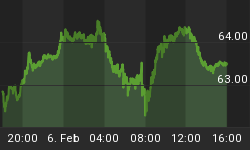Yes, you read that right: "Gold Facing Brisk Headwinds".
After spending 51 weeks on a buy signal, our gold model has issued a sell signal. Our gold model has been bullish for approximately 90 out of the past 100 weeks.
So why is the model bearish? Interest rate pressures. Our black box bond model issued a sell signal in late January, 2012, and this coupled with an increasing and positive 26 week rate of change on the 10 year Treasury yield has triggered a sell signal in our gold model.
Since 1976, our gold model (i.e., buy signals) has produced the following equity curve.
Figure 1. Equity Curve/ bullish
![]() Larger Image
Larger Image
If you were so smart to invest in gold during the times the model was bearish, you would get the equity curve in figure 2.
Figure 2. Equity Curve/ bearish
![]() Larger Image
Larger Image
Now focus your attention to figure 2 and the part of the equity curve prior to 1980. The model did not do a good job catching gold's meteoric rise in the 1970s. Here, bonds were in a secular bear market and inflation was rampant. Since 2000, gold has been in a bull market. This part of the equity curve has also risen despite the model being bearish, but the ascent of prices is clearly not as dramatic as when the model is bullish (see figure 1).
I think the take away message is this: 1) gold remains in a bull market; 2) prices are facing brisk headwinds as interest rate pressures rise; 3) other factors (i.e., central bankers expanding their balance sheets, currency devaluation, and as a hedge against inflation) are clearly at play and likely to keep a floor under prices.















